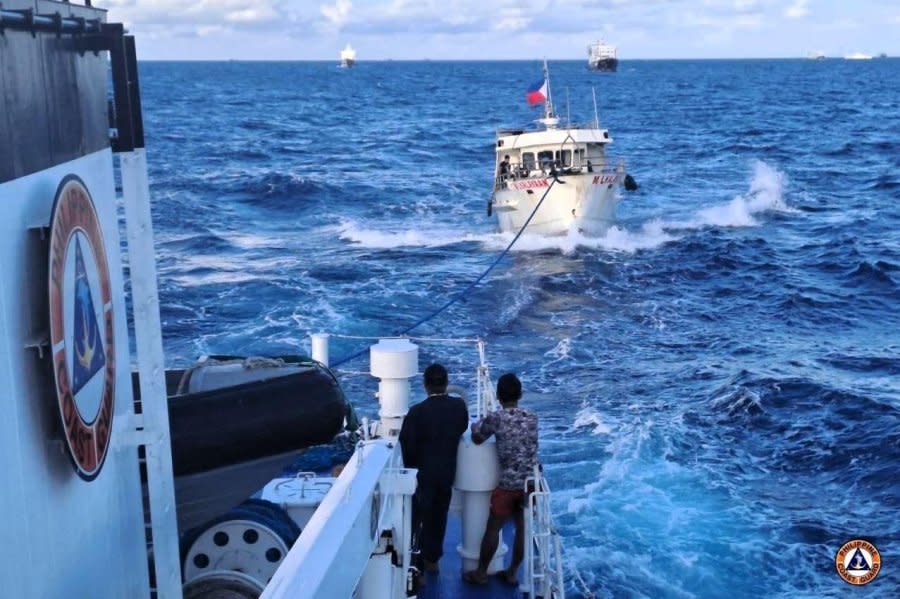Philippines, China trade accusations over confrontation near disputed shoal

Dec. 10 (UPI) -- The Philippines and China traded accusations Sunday over a confrontation between the Chinese Coast Guard and Filipino supply ships in an area of the South China Sea near a disputed shoal.
The Philippine Coast Guard said a supply ship, Unaizah Mae 1, was "rammed" by a Chinese military vessel as it approached the Second Thomas Shoal, known in the Philippines as Avungin Shoal, a submerged reef in the Spratly Islands of the South China Sea located 121 miles west of Palawan, Philippines.
The reef is occupied by Philippine Navy personnel aboard an intentionally grounded ship, the BRP Sierra Madre, which is regularly resupplied by other Filipino vessels. Manila claims the reef is within its exclusive economic zone -- an assertion challenged by Beijing, as well as by Vietnam and Taiwan.
The PCG claimed Sunday the Unaizah Mae 1 and another ship, the M/L Kalayaan, "were subjected to reckless and dangerous harassment at close range by CCG and Chinese Maritime Militia vessels" on their approach to the shoal, including the use of water cannon that caused "severe damage" to the M/L Kalayaan's engines, "disabling the vessel and seriously endangering the lives of its crew."
China, meanwhile, warned the Philippines to stop "infringing on its territorial sovereignty."
Gan Yu, a spokesman for the China Coast Guard, said in a statement issued to official media on Sunday the Philippine ships ignored China's "repeated" warnings and the Guard "took control measures and dispelled them in accordance with the law and regulations."
Gan said Unaizah Mae 1 is responsible for the collision because it "ignored international maritime collision regulations" abruptly turned in an "unprofessional and dangerous manner, and deliberately collided" with China Coast Guard vessel 21556.
The Philippine side "was entirely responsible" for what he called a minor collision.
Sunday's incident is the latest in a series of confrontation between Chinese and Filipino vessels in the area of the Second Thomas Shoal. Last month, for example, the United States joined the Philippines in condemning the Chinese Coast Guard for confronting a Filipino vessel with water cannon during a similar resupply trip to the BRP Sierra Madre.
The latest confrontation brought strong words from Philippines President Ferdinand Marcos Jr.
"The aggression and provocations perpetrated by the China Coast Guard and their Chinese Maritime Militia against our vessels and personnel over the weekend have only further steeled our determination to defend and protect our nation's sovereignty, sovereign rights, and jurisdiction in the West Philippine Sea," he said in an official statement.
Marcos said he has instructed the miliary to conduct their missions "with the utmost regard for the safety of our personnel, yet proceed with a mission-oriented mindset."
The president reiterated claims that the shoal is within the Philippines' exclusive economic zone, adding that "any foreign claim of sovereignty over it is baseless and absolutely contrary to international law."
And the United States on Sunday again sided with the Philippines, stating China "interfered in the lawful Philippine maritime operations and in Philippine vessels' exercise of high seas freedom of navigation."
"These actions reflect not only reckless disregard for the safety and livelihoods of Filipinos, but also for international law," U.S. State Department spokesman Matthew Miller said in a statement.
"The United States stands with our Philippine allies in the face of these dangerous and unlawful actions."
China backs its claims to large parts of the South China Sea by pointing to its controversial Nine-Dash-Line maps, which have been rejected by several nations, including the United States. The Hague's Permanent Court of Arbitration also ruled against the validity of the maps in a 2016 decision in a case that was brought against China by the Philippines.

